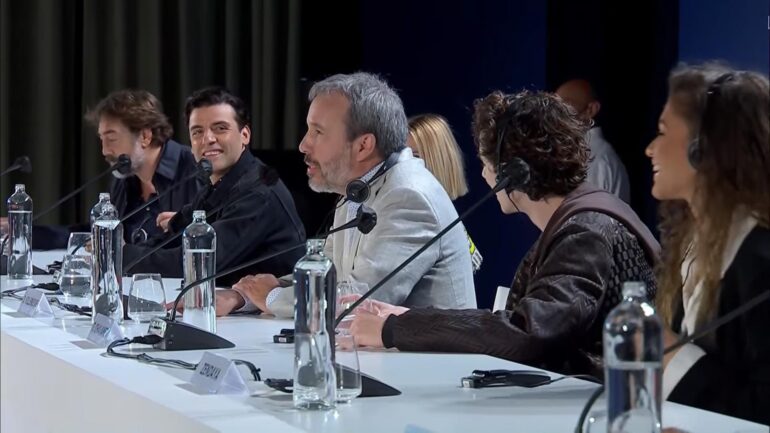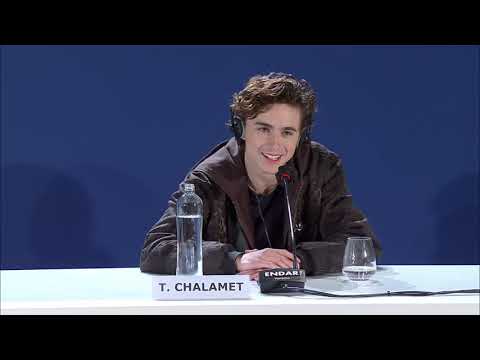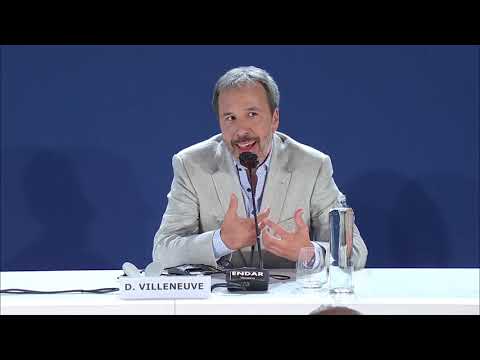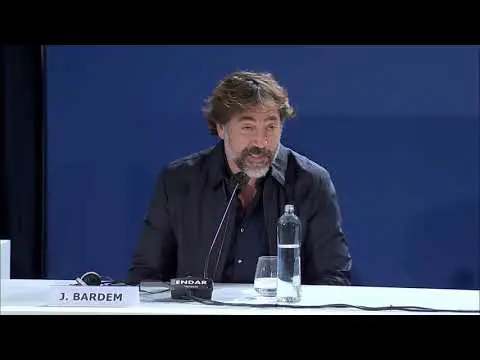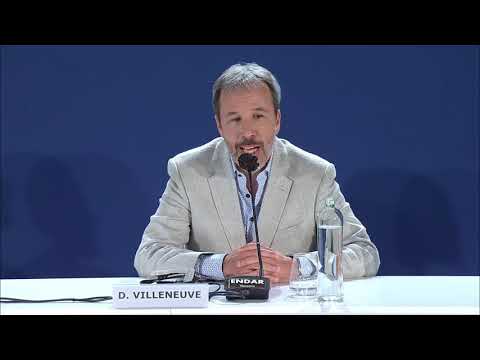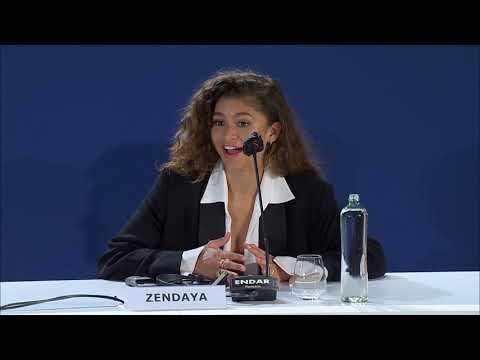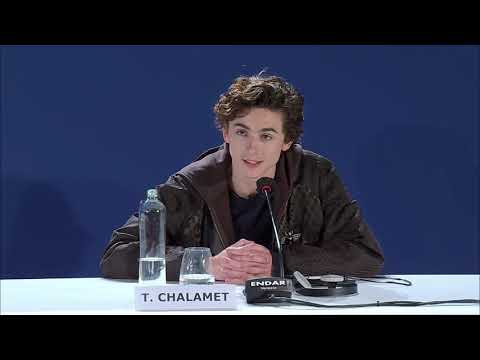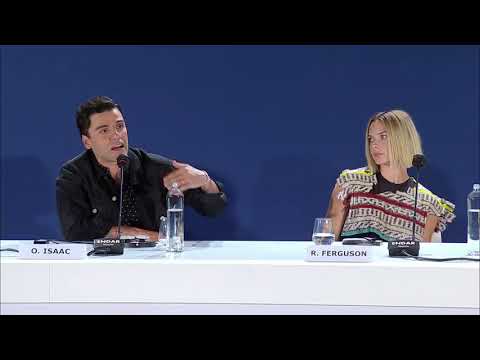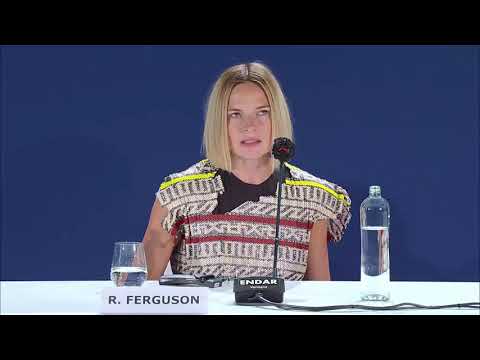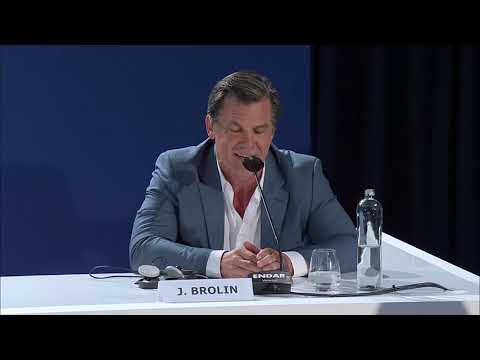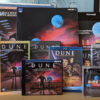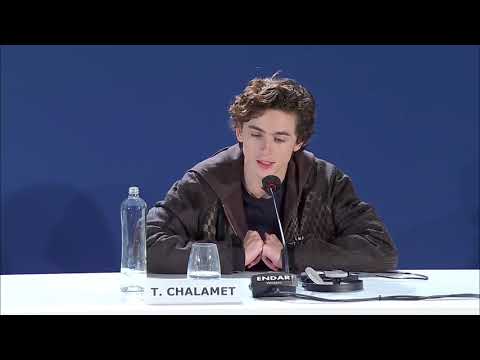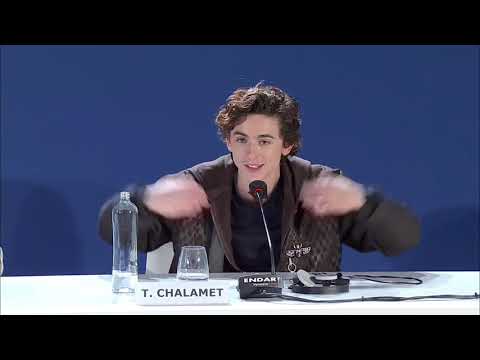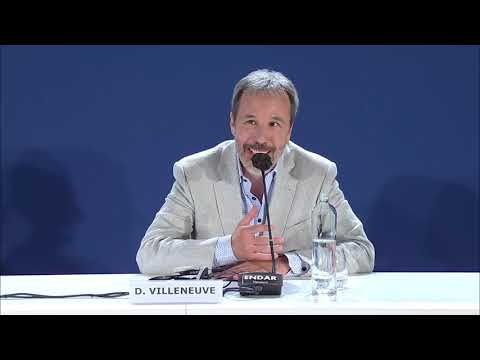Ahead of today’s world premiere of Dune: Part One at the Venice Film Festival, director Denis Villeneuve and six of the movies stars—Timothée Chalamet, Zendaya, Rebecca Ferguson, Oscar Isaac, Josh Brolin, and Javier Bardem—fielded questions from the press about the long-awaited movie. Topics included inspirations, approach to their roles, and the themes of the story in relation to the world today.
Watch or read the entirety of the press conference below. Each video (special thanks to DuneInfo for uploading these cuts) covers one question and captions are included below:
Denis Villeneuve Reflects on Reading Dune as a Kid
Because I understand that this book has been with you for very very long time, and so what is it that made it so important for you when you were young and now?
Denis Villeneuve: I kept saying to the cast: “push the button.” I think that… when I read it as a kid, I was like struck by Paul’s journey. The way he finds his identity, comfort into another culture, his relationship with nature and this feeling: this melancholy and this beautiful feeling of isolation that the character was going through, and struggling with all this heritage the weight of an heritage on his shoulder. That’s something that deeply moved me, that at heart, at the beginning.
Timothée Chalamet on Inspirations for Playing Paul Atreides
Hi, this is Matitz Maison from RTV Slovenia, I have a question for Timothée. The character of Paul Atreides has already given us one iconic performance, namely by Kyle MacLachlan in the David Lynch [Dune (1984)] film, so I wondered: While you were preparing for the role, did you use that performance as any kind of template or inspiration or did you prefer to stay away from that as much as you could and build something that is completely your own your own? Thank you.
Timothée Chalamet: Yeah, sorry the latter because—that was loud sorry—huge respect for Kyle’s performance and I love that version and I watched it about two months before we started shooting. I’ve been fortunate enough to work on other projects that have had prior iterations with great actors in them, and I have huge respect for all of them, but when Denis Villeneuve asks you to do a movie and do his version of a movie you forget all that and you make yourself as humble as the source material asks you to be and I guess just wanted it like that.
Villeneuve Talks About Challenges of Adapting Dune
Hi, Stephen Shaver here for the Boston Herald. Denis, I wonder when you got to do this massive movie which is called [Dune: Part One] what did you find was your biggest challenge actually, and secondly because it is part one what is the benchmark when we’ll find out we can have [Dune: Part Two]?
Denis Villeneuve: The biggest challenge doing Dune was by far to deal and master with Timothée’s hair because it’s alive and I had to direct intimately and I had to direct his haircut and you guys don’t know… Sorry—the biggest challenge I will say, was to try to find a balance between there’s the book [that] is so rich and it’s a book that takes all its strength into its details, and it was really to try to find an equilibrium between the information that someone that doesn’t know the book at all, the amount of information that the audience that don’t know the book [and] the amount of information they will need to understand the movie, without crushing them with exposition and trying to be of course as cinematographic as possible. So it’s like that was the big challenge: Trying to find the right amount of information so the audience could follow the story correctly and follow this adventure.
About the benchmark, that I’m not the one who will draw the line. I just I think that the one thing for sure is that Warner Bros. and Legendary are proud of the movie right now and putting all their efforts to bring it to the world on the big screen, which I’m very happy and we’ll see how it goes. I mean hopefully at the end of the day, these are of course difficult times for everybody and we all agree safety first I mean, but if the audience feels comfortable and there’s a safe environment I encourage them to to see this movie on the big screen. Because it has been dreamt, it has been designed, it has been made, it has been shot thinking IMAX, thinking the sound design, everything… It’s when you watch this movie on a big screen, on IMAX, it’s almost like a physical experience. You know we try to design a movie that will be as immersive as possible, so that’s why for me the big screen is part of the language.
Javier Bardem Explores Dune‘s Ecological Themes
Hello, I’m Pepe Pavlanez from Cadenasa Radio Spain. I would like to ask to Javier Bardem because Dune, I think in my opinion, talks about one of the most important problems today: environment. You are a green activist and I wonder if for you it’s important that movies like that talk about this? I hope my colleagues don’t kill me, I asked you if you could answer in English and in Spanish please? If you don’t mind of course.
Javier Bardem: In English and Spanish will take a lot of time… First in English I think: Yes the movie, the author was ahead of his time and he was already concerned about how the world was going towards in the sense of losing the capacity to have us all in good health as long as we violate its limits. And here we are today, dealing with that thinking that it’s something that is going to happen in the next future, but it’s happening as we speak, which is kind of scary. It’s on the governments, it’s on the big corporations. The solution [is] to really make a big step ahead and really change our minds about how we behave in this world and it’s a change of style of lifestyle for all of us. And it’s kind of scary, but is either that or a disaster as the people who know say.
So my character in this movie thinks that way as well and is defending the environmental aspect of the planet in order to at least make his tribe, his people survive and I was absolutely linked emotionally or conceptually to that color of the character immediately when I read it in the book, and when I read it in the script. So it is important that in a movie like this, Denis and the whole crew, the whole people have made this amazing movie tells that part of the story, because it’s one step more in the right direction.
Villeneuve Addresses the Political Aspects of Dune
To Mr Villeneuve, I have an impression that this film is politically very relevant today, so I would not say its message, but there is a political context subject in it. So could you talk about the process of adaptation?
Denis Villeneuve: To start quickly, I will say that as when Frank Herbert wrote Dune in the 60s, back then he was like doing like a portrait of the 20th century, but I think it became more and more through time like prediction that what will happen in the 21st. And sadly the book is more by far more relevant today; about the blend of the danger, of the blend between the cross mix between religion and politics, the danger of messianic figures, the impact of colonialism, as Javier pointed out the problem with the environment. And I thought and as this book stayed with me through the years, but it just felt more and more and more, through time, more and more relevant. And so I think that sadly, yeah I wish it was not the case, but I think the movie—it will speak to the world right now more than it would have done 40 years ago.
I will say, yeah, I will say that about the environment—to add to what Javier said—I think that future generations will judge us. I think it’s time to get angry right now. I think it’s time to push to make changes. I think it’s, I still have hope and I think that it’s time to to get into action. I think it’s like there’s an example, there’s a [negligence] and right now in Canada they don’t talk enough about environment. That should be the priority, that should be, that’s the thing we should talk about in this election right now and they don’t talk about it that much. It’s just like another subject. That should be the subject. Anyway, I don’t want to be moralistic. I just think that it’s about survival and that’s what this book is about: surviving.
Zendaya Shares Her Experience on the Movie’s Set
And the question to Miss Zendaya how about your haircut hairstyle I’m joking! What your presence is very, very big impact, so how do you prepare to this role?
Zendaya: Hi, well I didn’t really get much time to shoot with these amazing people. Some of which I got to meet today and I was extremely, I guess you could say, intimidated, because obviously there’s so many people here that I admire. And then the opportunity to work with Denis; I think he’s an extraordinary filmmaker and has always been someone that I also admired. So stepping into that, I was like I don’t have much time and there’s so many people that I have to hopefully stand next to and do somewhat of a good job, you know.
And it was intimidating and scary, but as soon as I got there, there was such a warmth and an embrace that I felt immediately comfortable and taken care of. And I all I had to do was be guided and Denis opened up and explained the world to me and was able to do that in a short amount of time. And everybody was so welcoming and it was a beautiful experience. I was only there for a few days, but I felt like I had been very quickly a part of a family. So yeah, I appreciate all of you guys for making it such a wonderful time and I feel extremely grateful to just be a piece of this really gorgeous puzzle that is Dune, you know. So I yeah, very very humbled and it was a special special time, but just trusted him.
Chalamet on Forming Bonds With Fellow Cast Members
And one question to Mr Chalamet: This is very epic story and your presence is very very strong in the whole movie, so personally what does it mean to you this movie and what impact do you think in your career? Thank you.
Timothée Chalamet: I’m going to try to go quickly too, because I know we gotta get to some other questions, but simply put this was the honor of a lifetime for me. And I like how Zendaya just put it, in some way I just had to be guided. Even though it was a project size I hadn’t been on before and every person, every artist I’m fortunate enough to sit up here with right now and, maybe I shouldn’t admit this, but I was able to lean on each one emotionally at some point over the course of these four or five months shoot.
These are all actors I’ve seen in projects that I admire. That’s not actors blowing smoke, that’s really—if we had more time I can have a longer conversation about it—and now I’m proud to call these, you know my sisters and brothers. If that’s our, with everyone up here, I hope we get to do a second one. That’ll be a dream, and yet in some way I’m simply grateful for the experience of doing this. And Josh Brolin said it beautifully, this morning in a different interview; when you make, the process of making the thing is different then putting it out. So there’s three versions of the movie: there’s a movie you read, there’s a movie you make, and there’s the movie they edit. And now there’s the movie we’re putting out there, so hopefully people go see it, but this has already been a dream come true.
Oscar Isaac and Rebecca Ferguson Elaborate on Being Parents in Dune
Speaking of guidance I’d like to bring in the conversation Rebecca Ferguson and Oscar Isaac, who play Paul’s parents. And you Oscar, you have the power of war, and Rebecca, you have the power of the mind. Can you talk a little bit about the relationship between your characters and Paul?
Oscar Isaac: Yes, hi hello. War, I don’t know. I feel like what Duke Leto brings, which is maybe very specific, is in some way he is the most recognizably human. Meaning he has no special powers, he has no—he has nothing, that is that none of the any of us don’t have, other than being the ruler of Caladan. So you know and the fact that he’s knowingly marching towards his demise and knows that, and that’s from the book too —I mean from the second people start talking about him, they’re saying you know he’s not going to make it and yet there’s still this tension about what he’s going to do and if he’s going to continue. And you know, not to get too highfalutin about it, but it’s very similar to we all know that we’re going to die yet we still have to continue and make choices.
And so I think, as far as a figure for his son, trying to bring some sense of humanity and nobility, and nobility not in the blue blood kind of way, but nobility in terms of seeking a higher level of consciousness and a higher way of of leading a nation and leading a people. Especially coming into this place, like how do you inherit all of this ugliness and all of this evil and all these machinations that are out of your control and try to move towards a more noble state of being. I think that is, that’s the big thing that he’s trying to give to the son, that has been prophesied to be some messiah or something, but as far as he’s concerned as long as you can hold on to that humanity and the higher idea of humanity you’ll be okay.
And it’s an interesting dynamic between [Duke Leto and Lady Jessica], that was something we had to talk a lot between Rebecca and I—about how much do they know about what each parent is doing. How much does he know about all of this, you know manipulations over the centuries, and what this means. You know, it starts with this thing that she was supposed to have a daughter and she gave me a son instead. You know, she broke the rules out of some sense of love, is it you know, is it because it was a sense of love or is it because she already knew it was time for this messiah to show up? It’s just it’s amazing because the more questions you ask, the deeper and deeper and deeper it goes.
Rebecca Ferguson: Hello, hello. It’s so interesting just listening to the interviews that we’re doing and listening to other people’s answers, because what I love is you can do films and you can ride along I feel on other people’s description of character description or emotion. And I feel we all have our own identity really and truly in this, we all have our own relationships to each other and to the spice and to, you sort of, you can’t just ride along.
I mean for me, for Jessica, it’s such a mind game and emotional one as well. That balance of being a mother, but also having such a strong belief in something greater than just being a mother. And one isn’t better or doesn’t sort of outsmart the other, but you know she comes from this sisterhood of the Bene Gesserit, who are there to manipulate the outcome of the universe basically. And then, conflicted with this passion and love for her belief and also I believe we spoke a lot about true love. What happens when you fall in love and the request of creating a son versus my chores? Which one do you go for?
You know it’s a constant struggle and you say mind—I mean this is her entire identity—it’s the mind struggle, but the emotional protection of children, of your child, of your loved ones, and knowing what is right. It’s finding those lovely balances. Thankfully I had a director helping me from one emotion to the other. I was quite confused sometimes.
Oscar Isaac: But yeah, but just to speak to Denis as well, you know it was something that we constantly and constantly spoke about. And trying to find that balance and how, you know how, much we reveal of what they know. And looking, you know constantly going back to the book, and talking about scenes and what can we add, what do we not need? How can we deepen the feeling of the family and particularly the emotional battle between duty and you know love of your family wanting to keep your family safe?
Denis Villeneuve: Nicely said Oscar, that was good.
Oscar Isaac: Thank you I was just looking at you approval.
Rebecca Ferguson: And Rebecca!
Josh Brolin Addresses Humor and His Role as Gurney Halleck
Hi, Helen Barlow from Australia. This is a question to Josh. I saw the Stephen Colbert thingy me question thing with a lot of you, and you were like the class clown and every time your name is mentioned Timothée smiles. So were you the kind of the class clown on the set and it’s hilarious that your first line is “I am smiling” when you’re not smiling, and how is it to play this stern military man given that you are this gregarious kind of person in real life and how was it on the set?
Denis Villeneuve: I apologize madam, Josh is not allowed to speak.
Josh Brolin: He put it in my contract. Wow man there’s so much to say, there’s so much intelligence up here that I can’t match. I think I was on set as Denis’s friend and I was somehow worked into the movie. I don’t even know. I haven’t read the book so I don’t know if the character is actually in the book, but I’m paid to make people laugh, apparently even in dramas. So I have the power of the testicles in this movie. Yes, I said it and that’s what I represent.
I’m here to protect the Duke, that’s all I know. I’m listening to all these—what I find fascinating in all seriousness, which is very difficult for me—what I find fascinating is what we created before we started the movie is not what we’re experiencing now. You know, you have ideas of what this was and what Frank Herbert Jr created. I just for a moment imagine Frank Herbert Jr listening to us right now and to think like, would he be proud? Is this what he intended? Was he talking about this when he was talking to Alan Watts in the 60s? Was he imagining us when he did LSD in the 60s? Whatever it is for sure for me.
Denis Villeneuve: : He imagined a big Brolin. LSD and a Brolin!
Josh Brolin: But I think he intended something very powerful and when I saw the movie that’s what I saw. You know, I know we’re kind of supposed to talk away from kind of the fandom of Dune, but when I saw it, when the movie was screened for me, I brought somebody who was a major fan and had read the series probably three times over when the were very young—eight years old, nine years old—and we screened the movie there was a long pause afterwards, and this man is 48 years old and from New York city, and he started screaming at the top of his lungs. And he said, “That’s what I saw, that’s what I saw as a kid! Yes yes yes!” You know, and when you see that kind of reaction, you realize it hits somebody on a very visceral level. You know allows for regression and allows for something else to happen, other than just a cinematic spectacle.
Director and Star Explore Key Scenes
The next question was answered by Denis Villeneuve and Timothée Chalamet in French. We’ll add translations, when available.
Chalamet Explains Walking Without Rhythm
First of all congratulations that you finally got to screen the film and I have a question for Timothée. Actually. could you tell us a little bit more about the sand walk and perhaps demonstrate it?
Timothée Chalamet: One of the best choreographers in the world, Benjamin Millepied who’s a director in his own right, who actually came up with the sand walk. So the first video, I think Rebecca and I would have gotten, was a video of him on Santa Monica beach in Los Angeles doing the sand walk. I’m afraid if I did it right now I’d be in rhythm and this whole room would be devoured by a sand worm.
So that’s a bad joke, but that was another thing to the question we just had in French, that was something that Denis dealt with in a very grounded way; so on set it wasn’t something that you know—not that we were being too precious or too self-serious—but it was something that was like, hey let’s not be goofy about this, let’s really get this right. And Rebecca correct me if I’m wrong, we had the scene in Abu Dhabi—and I think we found the dialogue to it afterwards—but I had to walk down and hopefully we see TikToks people do in the sand walk and stuff no.
Rebecca Ferguson: I’m gonna jump in. I remember thinking I need to study this. And then I thought, no thank god I’m not supposed to know it. I can get away with not knowing it and look silly.
Villeneuve on Choosing Hans Zimmer for Dune‘s Score
Hello, I have a question for Mr Villeneuve and you have mentioned before, the soundtrack, the biggest sounds. I was wondering have you, before the movie, the idea of making the music with Hans Zimmer or he came along the movie?
Denis Villeneuve: Actually when I decided to make this movie Hans was the very very first artist I asked to come on board. At the time we were finishing [Blade Runner 2049] and I remember having a conversation with Hans and, if I may, he said to me you know, that “It’s one of my biggest dreams to score Dune. It’s so much of a dream that I didn’t watch any anything.” He did never watch the previous movies, never watch anything, because he wanted to stay virgin and he wanted he said “I hope one day”. And we put, he came to Montreal and we had a nice dinner and we had a discussion about is it a good idea to try to bring to life one of your oldest, one of your most precious dreams? Is it a good idea to try to do that?
And we were not sure of the answer, but we did it and the thing is that Hans started to dream. I remember gave me his own copy of the book. He said “bring the book in the desert with you, it would be good for the the soul of the movie.” His old Dune book, I kept it with me and he started to work for months and months and months and months of exploration. He wanted to bring new sounds, he wanted to go out of his comfort zone, he wanted to approach music in a different way.
And strangely the pandemic came and strangely it forced him to find new ways to also to interact with the singers. And that were everybody, all the instruments all the singers everybody, were trapped in their own houses and sometimes you had those insane, the best singer on earth that were singing in their own closet, you know trying to. It was like beautiful to see everybody in their own little bubbles and bringing all the score from everywhere and creating all this this. We had one thing that we decided right from the start, is that it should be a feminine score, to enhance the feminine presence that we felt was very very very important and fundamental in the book. And so it was something that we both agreed, to bring the female strength from the score as well, as we did in screenplay, voila.
Stay tuned to Dune News Net for more coverage on the Dune: Part One world premiere at the Venice Film Festival, including a special episode of Dune Talk this weekend and interviews with those who have seen the movie.
Source: Venice Film Festival live streaming (September 3, 2021)


